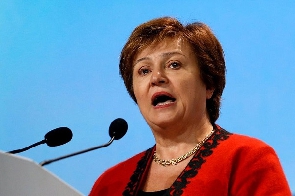 Kristalina Georgieva, the IMF Managing Director
Kristalina Georgieva, the IMF Managing Director
The International Monetary Fund (IMF) has revealed that its support program for Ghana will mainly be to rein in inflation and rebuild the country’s foreign reserve buffers.
In a recent statement by the IMF, Kristalina Georgieva, the IMF Managing Director, said Ghana’s economic crisis was precipitated by a combination of large external shocks and preexisting fiscal and debt vulnerabilities, and to resolve that, the authorities have launched a comprehensive and thorough reform program, to be supported by the ECF-arrangement.
“It is focused on restoring macroeconomic stability and debt sustainability as well as implementing wide-ranging reforms to build resilience and lay the foundation for stronger and more inclusive growth. Capacity development and continued support by development partners would be critical for the successful implementation of the authorities’ programme,” the IMF Managing Director explained.
She added that “Fiscal consolidation is a core element of the programme. A substantial and front-loaded fiscal adjustment has started with the 2023 budget. Enhanced revenue and streamlined expenditure will be combined with policies to protect vulnerable households and create room for higher social and development spending in the medium term.”
Georgieva believes that for Ghana’s economy to bloom, it is necessary for the country to implement policies that would ensure financial sector stability.
She said, “Preserving financial sector stability is critical for the success of the programme. Given the adverse impact of the domestic debt restructuring on balance sheets of financial institutions, the authorities will devise and implement a comprehensive strategy to rapidly rebuild financial institutions’ buffers and exit from temporary regulatory forbearance measures.”
The executive board of the IMF approved Ghana’s request for a US$3 billion bailout to support the country’s economic recovery on Wednesday (17 May).
EAN/BOG